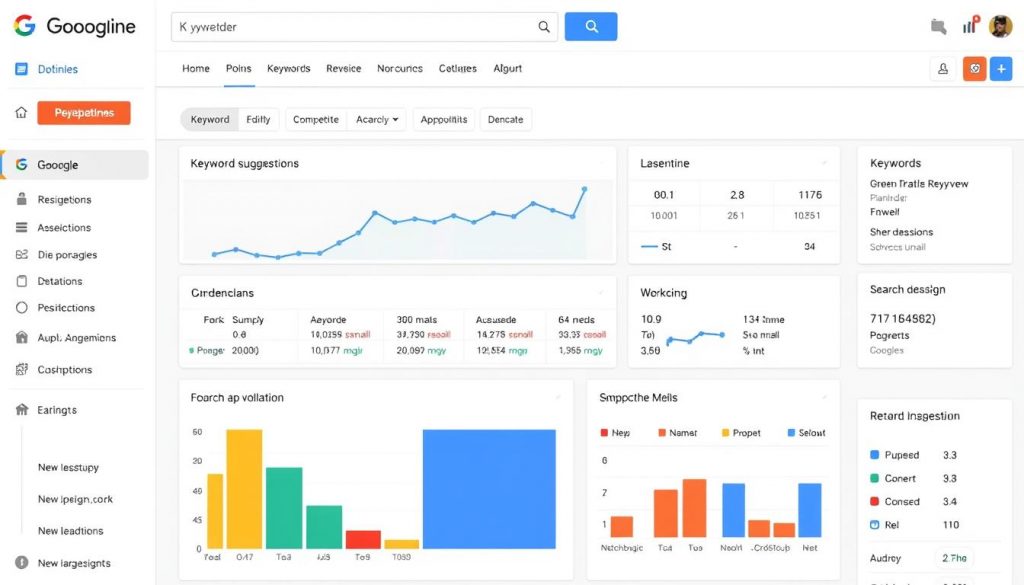Want to rank higher in search engine results and get more website visitors? The secret is using the right keyword research tools. These tools help you find, analyze, and pick the best keywords. They also let you see what your competitors are doing1. With the best tools, you can find the right keywords, check out your competitors, and make your content better for search engines. This makes keyword planning tools a key part of your SEO strategy.
When you start looking at keyword research tools, you’ll see many options. Prices range from free to hundreds of dollars a month. This shows how different tools can be, depending on what you need1. The important thing is to find the tool that fits your needs, whether you’re new to digital marketing or have a lot of experience. Using the best tools can really help you get noticed online.
Key Takeaways
- Keyword research tools are essential for effective content marketing strategies and can help you discover, analyze, and prioritize keywords, and monitor competitors1.
- The best keyword research tools can help you identify relevant keywords and analyze competitor strategies.
- Keyword planning tools can help you optimize your content for better search engine rankings.
- Semrush Keyword Magic Tool includes access to a huge database of over 25 billion keywords, perfect for digital marketers and SEO experts1.
- Semrush’s keyword database contains over 25 billion keywords2.
- Using the right keyword research tool can help you drive more traffic to your website and improve your online visibility.
Understanding the Importance of Keyword Research
Keyword research is key in SEO, helping you know your audience and make content they’ll love3. It lets you find the right keywords and phrases people search for online. Then, you can make your site better to match what they’re looking for4.
The main goal is to get your site seen more by search engines. This means more people will visit and maybe even buy from you5. To do this, focus on topics that people need and do deep keyword research. This way, you can make content that really speaks to your audience and boosts your site’s performance3.
Some important parts of keyword research are:
- Finding the right keywords and phrases
- Understanding what people are searching for
- Making content that matches what people are looking for
- Improving your site’s structure and tags for better visibility
Adding keyword research to your SEO plan can really help your site. It can lead to better rankings, more visitors, and more sales4. Remember, keyword research is a continuous task that needs regular updates for the best results5. For more tips on keyword research, check out keyword research guides and see why it’s so important for SEO.
Overview of Popular Keyword Research Tools
There are many tools to help you find the best keywords for your content. Google Keyword Planner, SEMrush, and Ahrefs are some of the top ones. They offer features like keyword suggestions, competitor analysis, and search volume data. This makes them key for any SEO plan. You can start with free tools like Google Keyword Planner.
Paid tools like SEMrush and Ahrefs offer more advanced features. SEMrush has over 25 billion keywords and does competitor analysis and search volume data6. Ahrefs gives exact backlink counts needed for top rankings, not vague difficulty indicators6. Tools like KWFinder help find long-tail keywords with low competition.
Many keyword research tools have affordable plans, making them available to all businesses. For example, KWFinder has a $29/month subscription with easy-to-use features6. Tools like Fan Page Robot help with social media marketing and content optimization. Using these tools can boost your SEO and online presence.
- Keyword suggestions
- Competitor analysis
- Search volume data
- Affordable pricing plans
By looking at these factors and choosing the right tools, you can make a strong keyword research strategy. This will help your business succeed online.
Features to Look For in Keyword Research Tools
When picking a keyword research tool, think about what you need for your business. Look for tools that offer search volume data, competitive analysis, and long-tail keyword suggestions. Keyword analyzer tools help craft strong keyword strategies and boost your site’s ranking.
A top-notch keyword research software gives you precise search volume data. This lets you see how much demand there is for certain keywords7. It should also do competitive analysis, showing how your rivals rank for the same keywords8. Long-tail keyword suggestions are key too, helping you target specific phrases with less competition and better conversion rates7.
Some important features to look for in a keyword research tool include:
- Search volume data
- Competitive analysis
- Long-tail keyword suggestions
- Pricing plans and limitations
When comparing differentkeyword research tool comparisonoptions, think about what matters most for your business. Pick a tool that offers the best value for your money8.
By focusing on these features and picking the right tool, you can build a winning keyword strategy. This will help improve your website’s ranking and visibility7.
How to Use Google Keyword Planner Effectively
To get the most out of Google Keyword Planner, you need to understand its features and how to navigate the interface9. This free tool requires a Google Ads account to access. It helps you find thousands of keywords for your SEO campaigns9. You can discover new keywords, see search volume and forecasts, and filter by competition levels10.
Google Keyword Planner lets you enter multiple keywords at once. You can also customize language and location targeting. Plus, you can view average monthly searches and top of page bid estimates9. You can organize keywords into ad groups by theme or category10. Using these features, you can build a strong keyword strategy that boosts your website’s traffic and conversions.

By following these tips and using Google Keyword Planner effectively, you can improve your SEO performance9. Always review and refine your keyword strategy. Make sure it matches your business goals and target audience10.
SEMrush: Advanced Keyword Research
SEMrush is a top-notch keyword research tool with advanced features. It includes the Keyword Magic Tool and competitor keyword analysis8. It has over 25.7 billion keywords in its database, giving you detailed keyword data. This includes SERP features like featured snippets, reviews, and image packs11.
The Keyword Magic Tool can find about 1.3 million possible keywords for a single seed keyword, like “workout”12. It’s a must-have for businesses and marketers wanting to boost their online presence. With SEMrush, you can check out your competitors’ keywords, spot market gaps, and craft a solid keyword strategy.
SEMrush shines by giving you deep keyword analysis and insights into your competitors8. It even has a free limited version, with paid plans starting at $117.33 per month, charged annually12. Whether you’re an experienced marketer or new to the field, SEMrush is a great pick for better keyword research and online marketing.
Ahrefs: Comprehensive Keyword Research
Ahrefs is a top choice for marketers and SEO experts. It offers detailed keyword analysis, including search volume and competitive data13. This helps in finding the best keywords for a solid SEO plan.
Ahrefs sifts through 110 billion keywords, focusing on 217 in the U.S13.. It helps users find the right keywords to boost their site’s visibility. The Keyword Difficulty score also shows how competitive a keyword is, aiding in choosing the best ones13.
Ahrefs has features like keyword exploration, competitor analysis, and content gap analysis14. These help users spot content gaps and create content that appeals to their audience. It also lets users track their site’s ranking and tweak their SEO strategy15.
| Feature | Description |
|---|---|
| Keyword Exploration | Identify relevant keywords and phrases |
| Competitor Analysis | Analyze competitors’ websites and keywords |
| Content Gap Analysis | Identify gaps in content and create targeted content |

Free vs. Paid Keyword Research Tools
When it comes to keyword research, you have two options: free or paid tools. Free tools like Google Keyword Planner are great for beginners16. But, paid tools like SEMrush and Ahrefs offer more features and accurate data, perfect for bigger budgets16.
Paid tools give you detailed insights into keyword difficulty and trends16. They also give more accurate search volume data. Tools like SE Ranking, Mangools, and Morningscore start at $55, $29, and $49 a month, respectively17.
Free tools have their limits and might not be as accurate as paid ones16. Yet, they can help find search volume and keywords. Using long-tail keywords can boost site traffic by up to 20%16.
The table below shows the main differences between free and paid tools:
| Tool Type | Features | Pricing |
|---|---|---|
| Free | Basic functionalities, search volume insights | Free |
| Paid | Comprehensive features, data accuracy, keyword difficulty scores | $29-$55/month |
In conclusion, your choice depends on your budget and needs. Free tools are good for starting out, but paid tools offer more and are better for bigger budgets16.
Integrating Keyword Research with Content Strategy
Creating effective content means linking keyword research with your strategy. This boosts your website’s ranking and visibility online18. Keyword research shows you what your audience wants, helping you make content they’ll love. For example, 70% of marketers say keyword research is key for better SEO18.
A smart content plan with keyword research brings big wins. You’ll see more organic traffic and better conversion rates19. By matching keywords with your content goals, you meet your audience’s needs and get results. Also, updating your content with the right keywords can make it more visible and engaging18.
Some important steps for combining keyword research with your content strategy include:
- Understanding what your keywords mean and making content that matches to boost engagement and sales19
- Using tools like SearchAtlas’s Keyword Researcher for competitor analysis to make your content more impactful and follow SEO best practices19
- Finding the right balance between using keywords and keeping your content readable and engaging19
By adding keyword research to your content strategy, you make content that works and meets your SEO goals. Always keep your keyword strategies fresh to keep up with changing consumer habits and search engine rules19.
Common Mistakes to Avoid in Keyword Research
When you do keyword research, it’s key to avoid common errors. One big mistake is only looking at high-volume keywords. This can cause you to miss out on long-tail keywords that are more likely to convert20. About 70% of marketers say knowing your audience well makes your keyword strategy better20.
Another error is ignoring local SEO keywords. This can mean you miss out on local traffic. It’s important to think about who your audience is and what they need. Using tools for keyword research can help you create better content and rank higher. For example, using long-tail keywords can lead to 2.5 times more conversions than just high-volume keywords20.
Some common mistakes to avoid in keyword research include:
- Focusing solely on high-volume keywords
- Neglecting local SEO keywords
- Ignoring search intent
- Not analyzing competitor keywords
By avoiding these mistakes and doing thorough keyword analysis, you can boost your SEO and get more conversions. As mentioned inkeyword research mistakes, it’s vital to think about your audience and their needs.
Good keyword research looks at many things, like what people are searching for and how they behave. By using tools and avoiding common errors, you can make a strong SEO plan. This plan will help you get more conversions and improve your website’s ranking. Remember, keyword research is a continuous process that needs regular checks and updates to get the best results21.
| Keyword Research Mistakes | Consequences |
|---|---|
| Focusing solely on high-volume keywords | Overlooking long-tail keywords with higher conversion rates |
| Neglecting local SEO keywords | Missing out on targeted traffic |
Future Trends in Keyword Research Tools
Keyword research tools are set to change a lot as the digital world grows. AI and machine learning will make these tools more accurate and fast22. They will quickly sort through huge amounts of data, helping us understand what people really want to find online22.
Voice search and long-tail keywords are also big changes coming our way. Every month, over 1 billion voice searches happen, with half of American adults using voice search every day23. This means we need to focus on longer, more specific keywords to meet these new search habits23.
Local search and location-based data are also becoming key. Keywords like “near me” or “nearby” are getting more popular, as people want specific local info23. Tools will need to use this data to give better advice.
Keeping up with these changes is vital for businesses wanting to be seen online. By using AI, machine learning, and understanding new search habits, marketers can stay ahead and succeed in the long run.
FAQ
What are the top keyword research tools?
Why is keyword research important for SEO?
What features should I look for in a keyword research tool?
How can I use Google Keyword Planner effectively?
What are the benefits of using SEMrush for keyword research?
How can Ahrefs help with keyword research?
What are the pros and cons of using free vs. paid keyword research tools?
How can I integrate keyword research with my content strategy?
What are some common mistakes to avoid in keyword research?
What are the future trends in keyword research tools?
Source Links
- 10 Best Keyword Research Tools to Boost Your SEO Strategy – WP101 – https://wp101.com/best-wordpress-keyword-research-tools/
- Best Keyword Research Tools: Top 18 for SEO Success – https://trafficthinktank.com/best-keyword-research-tools/
- The Importance of Keyword Research – https://www.spiderdigital.co.uk/blog/the-importance-of-keyword-research
- Why Is Keyword Research So Important? – https://www.woorank.com/en/blog/keyword-research-important
- What is Keyword Research? A Complete Guide – https://www.conductor.com/academy/keyword-research/
- 8 Top Keyword Research Tools for 2025 (Free & Paid) – https://backlinko.com/keyword-research-tools
- Keyword Research: An In-Depth Beginner’s Guide – https://www.getresponse.com/blog/guide-keyword-research
- The 4 best free keyword research tools in 2024 | Zapier – https://zapier.com/blog/best-keyword-research-tool/
- How to Use Google Keyword Planner [New Guide] – https://backlinko.com/google-keyword-planner
- Use Keyword Planner – Google Ads Help – https://support.google.com/google-ads/answer/7337243?hl=en
- Keyword Research for SEO: What It Is & How to Do It – https://www.semrush.com/blog/keyword-research/
- 11 Best Keyword Research Tools (Free + Paid) – https://www.semrush.com/blog/keyword-research-tools/
- Keywords Explorer by Ahrefs: Discover Winning Keyword Ideas. At Scale. – https://ahrefs.com/keywords-explorer
- Keyword Research: The Beginner’s Guide by Ahrefs – https://ahrefs.com/blog/keyword-research/
- The 10 Best Free Keyword Research Tools in 2024 – https://ahrefs.com/blog/free-keyword-research-tools/
- Top 10 Keyword Research Tools – Free & Paid | seobase – https://seobase.com/top-ten-keyword-research-tools-free-and-paid
- 15 Best Keyword Research Tools For SEO In 2025 (Free + Paid) – https://bloggingwizard.com/keyword-research-tools/
- Mastering Keyword Research for Effective Content Marketing – https://www.nomensa.com/blog/mastering-keyword-research-for-effective-content-marketing/
- Incorporating Keyword Research Into Content Strategy – Search Atlas – Advanced SEO Software – https://searchatlas.com/blog/incorporating-keyword-research-into-content-strategy/
- 10 Keyword Research Mistakes You’re Probably Making – https://medium.com/@annebonner/10-keyword-research-mistakes-youre-probably-making-f14c13d6909d
- Keyword mistakes: 8 pitfalls you can easily avoid – https://yoast.com/keyword-mistakes/
- Best 11 Keyword Research Tools 2025 | resultFirst – https://www.resultfirst.com/blog/seo-basics/11-best-keyword-research-tools-to-dominate-the-serps/
- 9 Game-Changing Keyword Research Trends You Need Now – https://keyword.com/blog/latest-keyword-research-trends/












